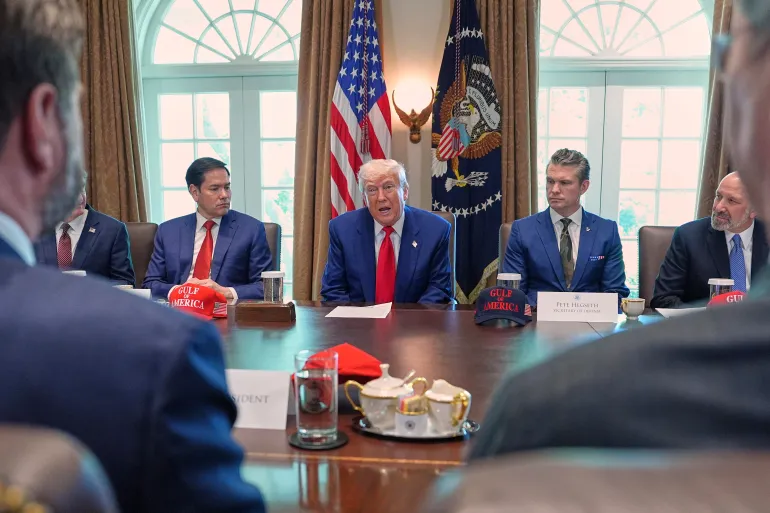As the war between Israel and Iran moves into its second week, President Donald Trump has announced he will give diplomacy “a chance” and postpone his decision on possible US military involvement for two more weeks, NaijNaira can report.
Reuters reported that White House Press Secretary Karoline Leavitt told journalists, “Based on the fact that there’s a substantial chance of negotiations that may or may not take place with Iran in the near future, I will make my decision whether or not to go within the next two weeks.”
Leavitt explained that Trump’s top priority is stopping Iran from developing nuclear weapons while staying open to peaceful negotiations.
“If there’s a chance for diplomacy, the president’s always going to grab it,” Leavitt said. “But he’s not afraid to use strength as well.”
Diplomatic talks are set to take place on Friday in Geneva with officials from Britain, France, Germany, the European Union, and Iranian envoy Abbas Araghchi.
The last round of talks between the United States and Iran broke down after Israel launched strikes on Iran’s nuclear and missile sites on June 12.
European diplomats said progress in Geneva may be limited, but they believe keeping the talks open is essential.
An Iranian official told Reuters that Tehran supports diplomatic efforts and urged Britain, France, and Germany to push Israel to end its attacks.
UK Foreign Minister David Lammy said, “A window now exists within the next two weeks to achieve a diplomatic solution.”
Lammy noted that preventing further conflict would help protect the wider region.
US envoy Steve Witkoff and Iran’s Araghchi have reportedly spoken several times by phone in hopes of reaching a peaceful settlement.
Sources said the talks touched on a US proposal that suggested enriching uranium outside of Iran, which Tehran has so far refused.
A diplomat familiar with the discussions said Araghchi signaled that Iran might show flexibility if the United States pressures Israel to stop its offensive.
Trump also revealed that Iranian leaders showed interest in holding direct talks, even suggesting a possible meeting at the White House.
“They even suggested they would come to the White House. That is courageous and not easy for them to do,” Trump said.
Dennis Ross, a former Middle East envoy, believes Iran is starting to feel pressure after Israeli strikes damaged nuclear sites, missile facilities, and key security targets.
“I do think the regime feels vulnerable,” Ross said.
When asked about military action, Trump told reporters, “I may do it, I may not do it.”
The United States remains the only country with powerful “bunker buster” bombs capable of destroying Iran’s deeply buried Fordow nuclear facility.
Mark Dubowitz, chief executive of the Foundation for Defence of Democracies, said Trump likely prefers a diplomatic solution but may be giving Israel more time to build US leverage in the talks.
Regional governments in the Gulf have warned that US military action could increase the risk of wider conflict and instability.
Anwar Gargash, advisor to the president of the United Arab Emirates, said, “You can’t reshape the region through belligerent force. You might resolve some issues, but it will create others.”
Trump is also facing resistance from key supporters within his “Make America Great Again” base who oppose strikes on Iran.
Public figures like Tucker Carlson and Steve Bannon have openly rejected US military involvement.
Trump’s campaign promise to end America’s involvement in Middle Eastern wars played a major role in his 2016 and 2024 election victories.
Recent opinion polls show that 60 percent of Americans are against US involvement in the Israel-Iran war.
Article updated 4 months ago. Content is written and modified by multiple authors.





